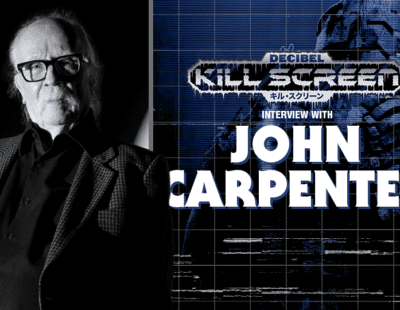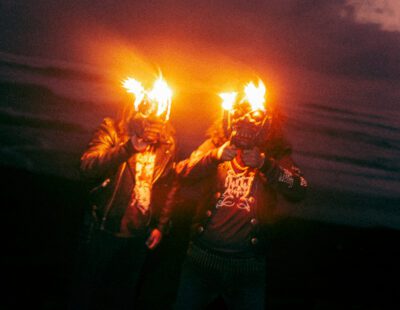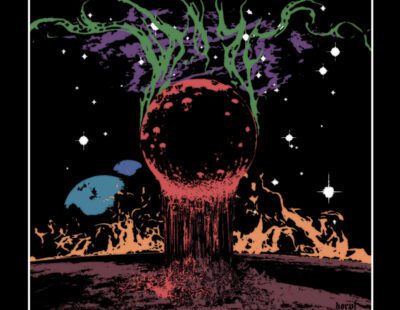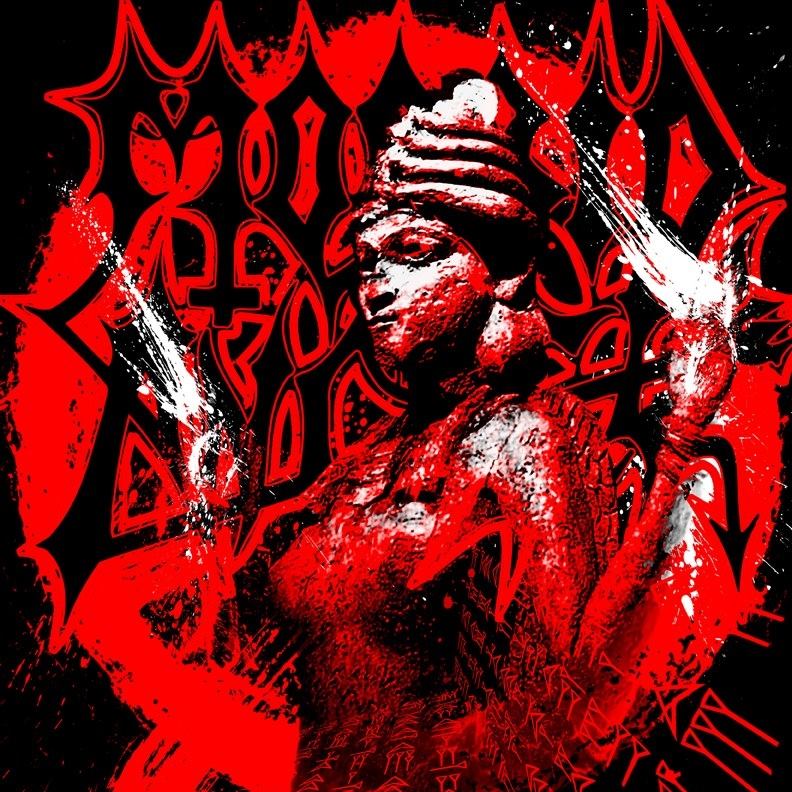
While researching the January 2018 cover story, Decibel discovered a global legion of hardcore Morbid Angel devotees for whom the band’s philosophy of boundary-smashing self-liberation had completely altered the course of their own lives.
Below we introduce you to the sounds and stories of five of these cultists.
CULT FILE #001: Botswana’s Overthrust
Here Overthrust frontman Tshomarelo Mosaka—aka Vulture Thrust—describes how Morbid Angel wound its serpentine way to him in Africa and set him on his own path of extremity.
“I was born and grew up in Rakops village in Botswana. I grew up in a metal family—my uncles listened to variety of old school metal bands from thrash, heavy metal and death metal. Back then it was difficult to get metal music from overseas, but my uncle ordered it through metal magazines and we luckily had friends and families who stayed overseas either working or attending school and they’d send music to us through post office or come with it when they come for holidays. I spent most of the time with my uncles and every day I was introduced to a new metal band.
“Young and energetic as I was, I wanted something more extreme than standard heavy metal. And when my uncle first played me Altars of Madness in 1996, I found it. There was something special about the power, aggression and brutality of Morbid Angel—I was instantly addicted to the sound. It made me feel super high, like I was on top of the world. Listening to Morbid Angel gave me confidence and the heart of a lion. I would not fear anything and it made me realize the world was just a game.
“I took their pictures from magazines and pasted in my room. I started dressing up like Morbid Angel members. By then my uncle Dux gave me the Morbid Angel albums Covenant and Blessed Are the Sick with lyrics and art. I started dreaming about having my own death metal band in future; about playing overseas and sharing stage with Morbid Angel.
“Morbid Angel are very good teachers and our band Overthrust is definitely a product of observing and internalizing the lessons of Morbid Angel. We incorporate fast blast beats, guttural vocals and heavily distorted guitar riffs in our music and are currently one of the most popular old school death metal bands in Africa. We’ve toured Europe twice and were the first metal band in history from Africa to play Wacken OpenAir Fest in 2016. But our greatest dream still is to open a show for Morbid Angel—what I call true music of the Gods.”
CULT FILE #002: Kathmandu, Nepal’s Dying Out Flame
Dying Out Flame write and perform “Vedic death metal,” which frontman Aabeg Gautam described in a 2014 Decibel interview as, “Hindu themes derived from ancient Vedic philosophy/mythology and literature, incorporating ancient sanskrit shlokas, and fusing traditional Hindu classical music to brutal death metal.”
As Gautam relates below, the band’s brilliant seriously under-appreciated debut, Shiva Rudrastakam, drew both spiritual and musical inspiration from the mighty Morbid.
Back in Aabeg Guatam’s old high school days, there was a standing, mostly friendly challenge amongst his gaggle of pissed off metalhead classmates to see who could discover the most brutal, unrelenting new sounds first. And the future Dying Out Flame frontman eventually took the gold with Morbid Angel’s Thy Kingdom Come demo.
“‘Blasphemy of the Holy Ghost’ became something of an anthem for me and was my phone ringtone for so long,” Guatam tells Decibel with a laugh. “I immediately thought, ‘I’ll never find a heavier or more addictive band than this—ever’ and my feelings for this band to this day remain the same.”
Sure, Guatam had already encountered and fallen in love with a slew of extreme metal bands—from Deicide to Malevolent Creation to Immolation—but the sonic lava flowing from Tampa held a special allure.
“Morbid Angel to me was always way out ahead of all others,” Guatam says. “Every album emanates pure hostility and aggression, total misery and hate. I will forever support the way they express their music and views—all hail old school divine forces of wickedness.”
Indeed, this, Guatam avers, is one of the primary animating forces behind his own groundbreaking band.
“When I heard Altars of Madness—it fuckin’ blew me away; it impacted me with the intensity of hellfire. I said to myself, ‘You must accomplish something in this realm.’ And then Covenant and Gateways to Annihilation? These are the albums that help shaped my death metal creativity and skills. And Shiva Rudrastakam flows from that continuous influence.”
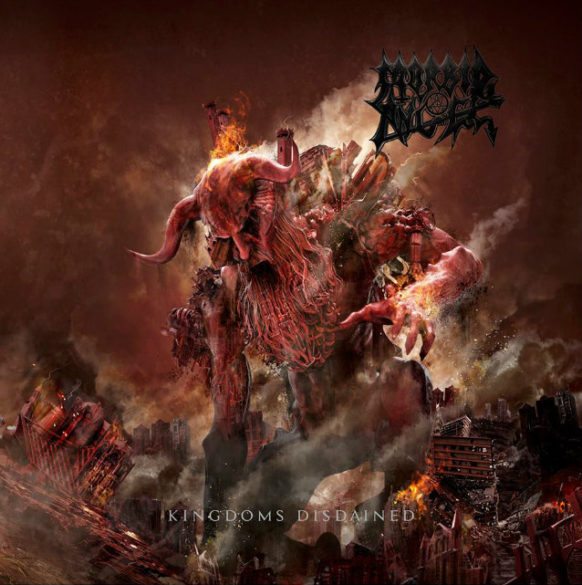
CULT FILE #003: Cairo, Egypt’s Scarab
Introducing Scarab guitarist Al Sharif Marzeban, who followed Morbid Angel down the road less traveled in one of the least hospitable social climates imaginable—and not only survived but thrived.
“I first heard Morbid Angel at my school in Cairo, Egypt in 2000. I was in 7th grade and a friend in school had given me the CD which was bought from abroad. I was overwhelmed by the massive sound—I had never encountered a band that extreme in its sound and production.
“Overnight my life philosophy changed. This isn’t an easy place to be that loud and strong; it scares parents and those who aren’t familiar with such extreme music. Socially, of course, I became an outcast. My close friends started seeing me as the nice guy turning into the dark, unhealthy guy disconnecting from ‘real life’—which to them was pop culture and all that fake stuff nowadays you hear.
“At that point I was playing heavy music, but nothing as heavy as the sounds that Trey summoned. I felt the need to express the same sentiment and power. I listened to every Morbid Angel album—Gateways to Annihilation annihilated me personally [laughs]—until I thought I might be ready to create my own band and to pursue freedom of expression which was so hard here in Egypt.
“Scarab songs like ‘Devourer of the Unjustified,’ ‘War to End,’ ‘Blinding the Masses,’ and ‘Eye for Sanity’ try to deliver something unique and raw as Morbid Angel delivered to us. Why? Because Morbid Angel are the godfathers of extreme death metal period, that’s why.”
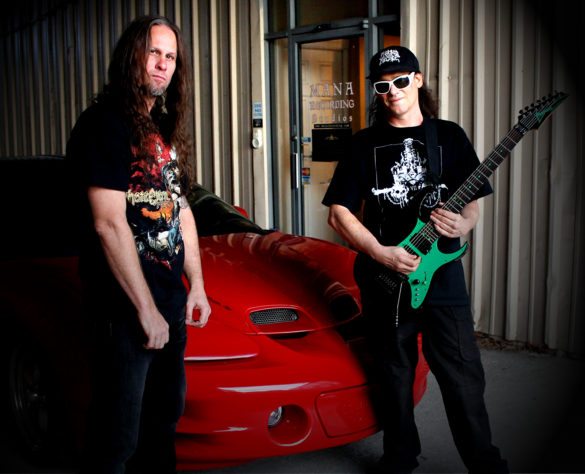
CULT FILE #004: Rome, Italy’s Hideous Divinity
A fateful late night “Rapture” courtesy Italian MTV sparks a burning desire in future Hideous Divinity vocalist Enrico H. to seek his destiny “Where the Slime Lives.”
“Oddly enough, my first MA encounter was a videoclip— “Rapture” on Headbanger’s Ball at some crazy late night on Italian MTV. My first reaction was looking at Pete’s feet mistreating his kick pedals and thinking: “OK, this must be fake. No one can do this here in reality.” Pete’s double kick wall together with that “unholy” guitar sound was like hearing a bell waking me up from sleep.And then Dave Vincent’s vocals kicked in—evil, savage, yet totally intelligible. That was enough. Sold. I thought, “I don’t know how. I don’t know when. I don’t know with whom. But I want to play this.”
“I remember putting Domination in the CD player, pressing play… “Dominate” starts: Boom! Then “Where the Slime Lives”: Ka-boom! How many other records in death metal history have such left jab-right cross start?
“As narrated by Albert Mudrian in his amazing Choosing Death book, the Morbid Angel message was also part of their life philosophy, from the time they were all working in a car wash in North Carolina during day and jamming every single night. What that taught me in my very early days as a death metal wannabe musician was: ‘Wanna do this for real? Then be ready to bust your ass day and night in some stinking rehearsal room with 45°C temperature in summertime and minus something temperature during wintertime. Because death metal is all about will.’
“When a band is considered one of the godfathers of both death and black metal, it is safe to say that the Morbid Angel permeated everything I’ve written since day one. Sometimes I was conscious of this. Other times I was not—I would listen again to some stuff I recorded in the very old days and think, ‘Unbelievable: I was copying Morbid Angel and barely aware of it!'”
Cult File #005: Boston, Massachusetts’ Hekseri
Dark fiction author and blackened death shredder extraordinaire Larissa Glasser finds uniting the Morbid Angel magic to witchcraft can be a marriage made in the most interesting parts of Hell via Hekseri.
“I came to Morbid Angel a little late. Our stores didn’t have much a metal section, but I’d managed to listen to bands such as Death really early on—like right when Leprosy came out in ’87. Then I totally got into Deicide just before Nirvana became a thing in the early 90s. I got acquainted with Morbid Angel around 2002, when I was looking to form an extreme metal band in Boston. They didn’t sound like a lot of other bands. I mean, you can hear the Scott Burns sound in Florida Death Metal, but Morbid had the riffs that seemed even more kinetic and technical than Slayer. Plus, they sort of had this echo-y darkness in their sound that just…I dunno, oozed cosmic evil. I can definitely hear that influence in bands like Nile and Portal.
“Morbid Angel—along with Incantation—really influenced the riffs I wrote in Hekseri. For example. those chromatic low-scale runs, especially during the fast middle part of “Awakened to Wrath.” So, yeah… darkness. Atmosphere. I also had studied jazz guitar during high school, so Azagthoth’s technical work really appealed to me.
“Chapel of Ghouls”? Just the title of that song gives me the creeps. So
fucking dark.





